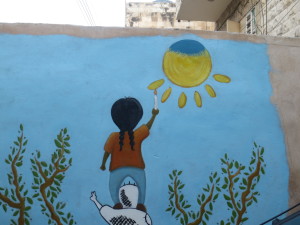Visit Nablus….and then sing a song!
febbraio 28, 2014 in Palestina, Traduzioni da Anna Zorzi
Written by Sonia Trovato, translated by Anna Zorzi ![]()
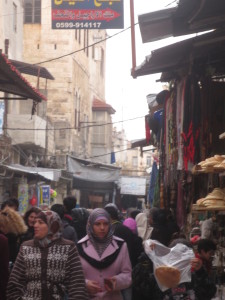 Still shocked at the visit to the refugee camp, now you are on the coach heading to Nablus, symbol of the Palestinian resistance. You have just entered the old town and here the atmosphere is different from the more cosmopolitan Ramallah. First of all you feel a kind of diffidence, a sort of annoyance at your western ways, your sunglasses and digital cameras.
Still shocked at the visit to the refugee camp, now you are on the coach heading to Nablus, symbol of the Palestinian resistance. You have just entered the old town and here the atmosphere is different from the more cosmopolitan Ramallah. First of all you feel a kind of diffidence, a sort of annoyance at your western ways, your sunglasses and digital cameras.
Some kids, hanging around an alley, look at you for a short time then take a broom and begin to sweep the front door. “How kind of them” you say to yourself, thinking they are going to let you in, but while lost in your thoughts, they violently shout at you “yalla, yalla!”(“go away, go away!”). While rolling a cigarette you attract the half-shocked and half-curious looks of a group of elderly and the interest of a cute smiling guy who comes to you and asks for some hashish.” Ehm, no, it isn’t a ……. “ and you stop mid-sentence since you haven’t got the slightest idea that the English word for “spinello” is “joint”. Your exaggerate love for these people and their wilfulness clash with your militant feminism here in Nablus. You take pictures of veiled women and you see a little girl who, trying to avoid your camera, hides her face behind her shopping bag. You feel amazed at such a strong sense of decency at such a young age. One of your friend is going to take a picture of a small cart when she bumps into two young couples passing by. Immediately one of the two men starts shouting at her “no photos, no, no!” and hides his woman with his body, pushing her behind his own back. The irritation is skyrocketing!
Your feminist readings make you feel right to condemn the subtle subordination of women to men in Italian and European society, but you don’t know what to do in front of a culture you don’t belong to and you don’t want to impose yourself on as a snobbish colonizer or moralizer. 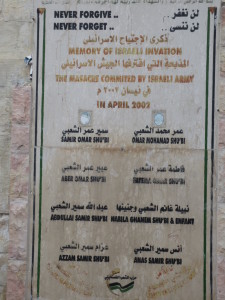 You remember a graphic novel by Mariane Satrapi, less popular than the worldwide successful Persepolis. Its title is Taglia e cuci (Cut and Sew) and its protagonists are a group of women, including the authoress, who share gossips and funny complains about the treatment imposed on themselves by an obscurantist, misogynist Iran . Then you imagine that those women you see escorted by their men while going to the town market , so coy and wary of avoiding any looks, are the same women who wake up magically in the evening and, leaving their husbands napping on the sofa after a hard work day and an abundant dinner, sneak out of their house and sit on a chair on the threshold to chat with their friends. And you see them, on the front doors, talk and laugh at the men’s small eccentricities and absurdities, or daydream about a near future where being wives and mothers is a choice and not a necessity to escape social exclusion. You imagine such a scene and immediately think about Suad Amiry, the Palestinian woman writer who is for you the best example of women’s emancipation, and then you feel better. But you are faced with another meaning of photography: in Nablus, an open-air graveyard, photography is synonym of death and tragedy. Every inch of the town is covered with pictures of martyrs, above all young and very young ones, who lost their lives during the Israeli vengeance against the Second Intifada. The Al-Shu’bi family has even got a plate commemorating its peculiar case: an Israeli bulldozer, while advancing across the little square which was too narrow for it, crashed down inexorably the house of the Al-Shu’bis, burying under the rubble ten people, two of which only survived. The inhabitants see Western countries as that part of the world which does nothing to stop these crimes against humanity, then you can understand why here in Nablus you feel more than anywhere else a strong willingness of conservatism, as if the survival of Palestinian identity depended on that.
You remember a graphic novel by Mariane Satrapi, less popular than the worldwide successful Persepolis. Its title is Taglia e cuci (Cut and Sew) and its protagonists are a group of women, including the authoress, who share gossips and funny complains about the treatment imposed on themselves by an obscurantist, misogynist Iran . Then you imagine that those women you see escorted by their men while going to the town market , so coy and wary of avoiding any looks, are the same women who wake up magically in the evening and, leaving their husbands napping on the sofa after a hard work day and an abundant dinner, sneak out of their house and sit on a chair on the threshold to chat with their friends. And you see them, on the front doors, talk and laugh at the men’s small eccentricities and absurdities, or daydream about a near future where being wives and mothers is a choice and not a necessity to escape social exclusion. You imagine such a scene and immediately think about Suad Amiry, the Palestinian woman writer who is for you the best example of women’s emancipation, and then you feel better. But you are faced with another meaning of photography: in Nablus, an open-air graveyard, photography is synonym of death and tragedy. Every inch of the town is covered with pictures of martyrs, above all young and very young ones, who lost their lives during the Israeli vengeance against the Second Intifada. The Al-Shu’bi family has even got a plate commemorating its peculiar case: an Israeli bulldozer, while advancing across the little square which was too narrow for it, crashed down inexorably the house of the Al-Shu’bis, burying under the rubble ten people, two of which only survived. The inhabitants see Western countries as that part of the world which does nothing to stop these crimes against humanity, then you can understand why here in Nablus you feel more than anywhere else a strong willingness of conservatism, as if the survival of Palestinian identity depended on that.
Anyway, five factors, two of which of culinary nature, have been enough for you to forget the initial feeling of disorientation. The first is the falafel, which was the best you tasted during the week and which you now regret if compared to the stringy rubbery balls bought at a kebab shop here in Brescia. The second culinary factor are delicious biscuits with sesame seeds you don’t remember the name of. You buy half a kilo of them and you ration them so as you can taste them as long as possible till the end of the journey. You are at the baker’s, waiting for your turn, and a thin, foxy-looking kid pull your jacket and asks you for “one kiss”. “How funny!” you think ,you kiss the little boy and watch him trot along proudly to his friends, who elbow each other and giggle.
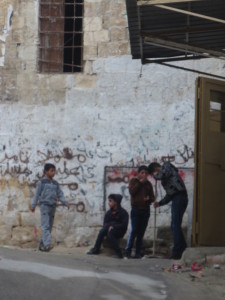 Then you try the Turkish coffee in a newly-open Café. Even though you know you will never get used to that drink (it’s too disgusting for you), you feel immediately at home in that place. You replace the faces of your travelling companions with those of your old friends and there you are with Serena, Marta, Claudio, Fabri, Alby, Fede, Meghy, Giordy,all of you sitting around a table and exchanging the same old talks which never lose their humour and which always make you feel a close-knit group. You start talking to the barman, a young man who has put all his hopes in that business as a proof of faith in the future that no bulldozer will ever destroy. You speak broken English, nonetheless you can communicate with each other because it’s the universal language of the youth, the empathy, the curiosity of the Other which links you all. It’s the same language you spoke two years ago in Dublin, which let you socialize with a crazy Irish duo, who probably understood half of what you were saying.
Then you try the Turkish coffee in a newly-open Café. Even though you know you will never get used to that drink (it’s too disgusting for you), you feel immediately at home in that place. You replace the faces of your travelling companions with those of your old friends and there you are with Serena, Marta, Claudio, Fabri, Alby, Fede, Meghy, Giordy,all of you sitting around a table and exchanging the same old talks which never lose their humour and which always make you feel a close-knit group. You start talking to the barman, a young man who has put all his hopes in that business as a proof of faith in the future that no bulldozer will ever destroy. You speak broken English, nonetheless you can communicate with each other because it’s the universal language of the youth, the empathy, the curiosity of the Other which links you all. It’s the same language you spoke two years ago in Dublin, which let you socialize with a crazy Irish duo, who probably understood half of what you were saying.
The trip to Nablus ends in a moment of strong emotion. You meet a group of very young Italian and Palestinian actors who want you to see the rehearsals of the pièce they are going to perform in a few days. 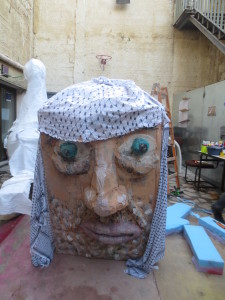 It is a minimal show, based on the gestures and the security protocols tourists and Palestinians are subjected to and which are shocking for whoever lives in a free country. During the rehearsals they are going to sing the Resistance songs Unadikum and Bella ciao. The Bella ciao which Vik murmured on board one of the fishing boats of Gaza, perhaps to bear up against the huge military ships of the Israelis, ready to fire against the unarmed fishermen. The Bella ciao which is so abused in Italy since it is often sung by unworthy people and which now, in that room, gains its deepest meaning back and makes that moment a moment of cultural exchange and of shared values like the Resistance, struggle for freedom, love for motherland. Una mattina mi son svegliato e ho trovato l’invasor (one day I woke up and I found the invader in my country): that’s the Palestinian tragedy in only one clause, the initial clause of our best partisan song and which is now universal heritage.
It is a minimal show, based on the gestures and the security protocols tourists and Palestinians are subjected to and which are shocking for whoever lives in a free country. During the rehearsals they are going to sing the Resistance songs Unadikum and Bella ciao. The Bella ciao which Vik murmured on board one of the fishing boats of Gaza, perhaps to bear up against the huge military ships of the Israelis, ready to fire against the unarmed fishermen. The Bella ciao which is so abused in Italy since it is often sung by unworthy people and which now, in that room, gains its deepest meaning back and makes that moment a moment of cultural exchange and of shared values like the Resistance, struggle for freedom, love for motherland. Una mattina mi son svegliato e ho trovato l’invasor (one day I woke up and I found the invader in my country): that’s the Palestinian tragedy in only one clause, the initial clause of our best partisan song and which is now universal heritage.

